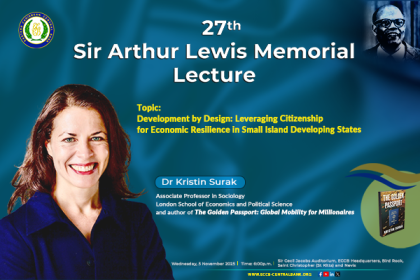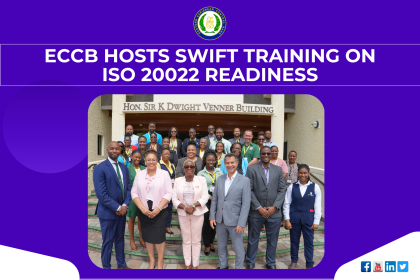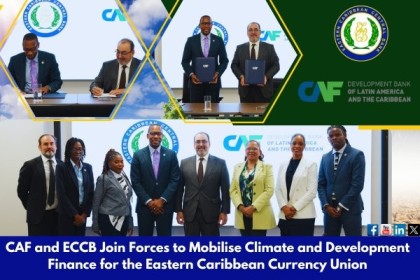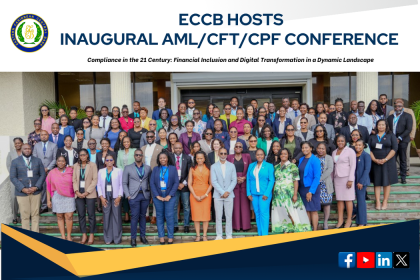
Opening Ceremony of 7th Growth and Resilience Dialogue Charts Clear Path for Transformation of Healthcare Sector
Leaders speaking at the Opening Ceremony of the 7th Growth and Resilience Dialogue 2023 on 25 April, shared key perspectives and visions for the region’s healthcare transformation.
Prime Minister and Monetary Council Member for Saint Christopher (St Kitts) and Nevis, the Hon Dr Terrence M. Drew, called on the region to focus on developing Centers of Excellence in each of the ECCB member countries to fortify healthcare systems, ensure access by all to quality healthcare, and ensure sustainable island states. He also signaled the need for the region decision makers to approach technologies with an open mind and extract maximum knowledge so as to position the region to be successful in this changing world. He highlighted several policies and actions taken by his government to advance healthcare transformation including the purchasing of critical health equipment, the development of strategic alliances with international health service providers to advance the knowledge capacity of the national healthcare system and plans to build a modern, smart, state of the art hospital.
Governor of the ECCB, Timothy N.J. Antoine, emphasised the criticality of primary healthcare and the need to invest more in primary healthcare to save lives and livelihoods. Referencing the data that attributed near eight of 10 deaths in the region to non‑communicable diseases, he emphasised that attacking the scourge of non‑communicable diseases is productive for our families, our public finances, our foreign reserves and our economy. He also reminded the audience that each individual must take personal responsibility for his/her health care and should include the following in wellness care practices: adoption of healthy eating, active lifestyles and a culture of medical check-ups. He echoed Prime Minister Drew’s call for the adoption of effective and collective action to fortify our healthcare systems
Director General of the OECS Commission, H.E. Dr Didacus Jules, underscored the importance of health as a key element for economic growth, noting the region’s vulnerabilities to infectious diseases outbreaks, environmental vulnerabilities and economic shocks. He further highlighted the ongoing work done by the OECS to advance a suitable and sustainable model of healthcare for the region including: joint procurement of supplies and services, regional collaboration on chronic diseases, as well as the pursuit of joint research and plans for a regional certification regime for health care service providers. He referenced the signing by member governments of the 2017 OECS Declaration of Health which reflected members ongoing commitment to regional solidarity in healthcare.
While he applauded the long overdue and overlooked opportunity to incorporate medicinal cannabis and indigenous products and practices in an appropriate and sustainable manner in our health care systems, he underscored the magnitude of such an undertaking, noting that several windows of opportunities had already closed with respect to securing intellectual property rights to the region’s indigenous herbs and plants as those rights had already been appropriated by international companies. He further cautioned against the marginalisation and or disadvantaging of the region’s citizenry in the pursuit of these now in focus economic growth sectors.
The World Bank’s Country Director for the Caribbean Region, Ms Lilia Burunciuc, affirmed the view that while not without its challenges given the peculiarities of the region, with careful planning and innovation, the region can create an economic model for healthcare that is environmentally sustainable and economically viable.
She reiterated the following in the pursuit of a sustainable and agile model for healthcare:
- A stronger focus on preventive and primary care to reduce the burden of non‑communicable diseases.
- Strong public health systems focused on disease surveillance, vaccination programmes and environmental health initiatives critical to preventing and controlling emerging infectious diseases.
- Access to healthcare for all citizens (universal healthcare coverage) as a fundamental right for all citizens regardless of their ability to pay achieved through a combination of public and private sector financing with mechanisms to protect against high out of pocket expenses.
- Improving the efficiency of health financing within the available fiscal space. Not necessarily more spending but spending more efficiently.
- Collaborate regionally to address the obstacle of scarce resources thereby improving access to specialised health care services and share best practices and learnings to improve the care provided.
- The greater use of technology to improve the quality of healthcare provided.
The presentations by the leaders at the Opening Ceremony provided a strong foundation to shepherd the two-day discussion along a trajectory focused on the critical steps to implement transformation in the healthcare sector.
Click here to access the presentations from the 7th Growth and Resilience Dialogue. For more information on the 7th Growth and Resilience Dialogue, visit: https://www.eccb-centralbank.org/7th-growth-and-resilience-dialogue






